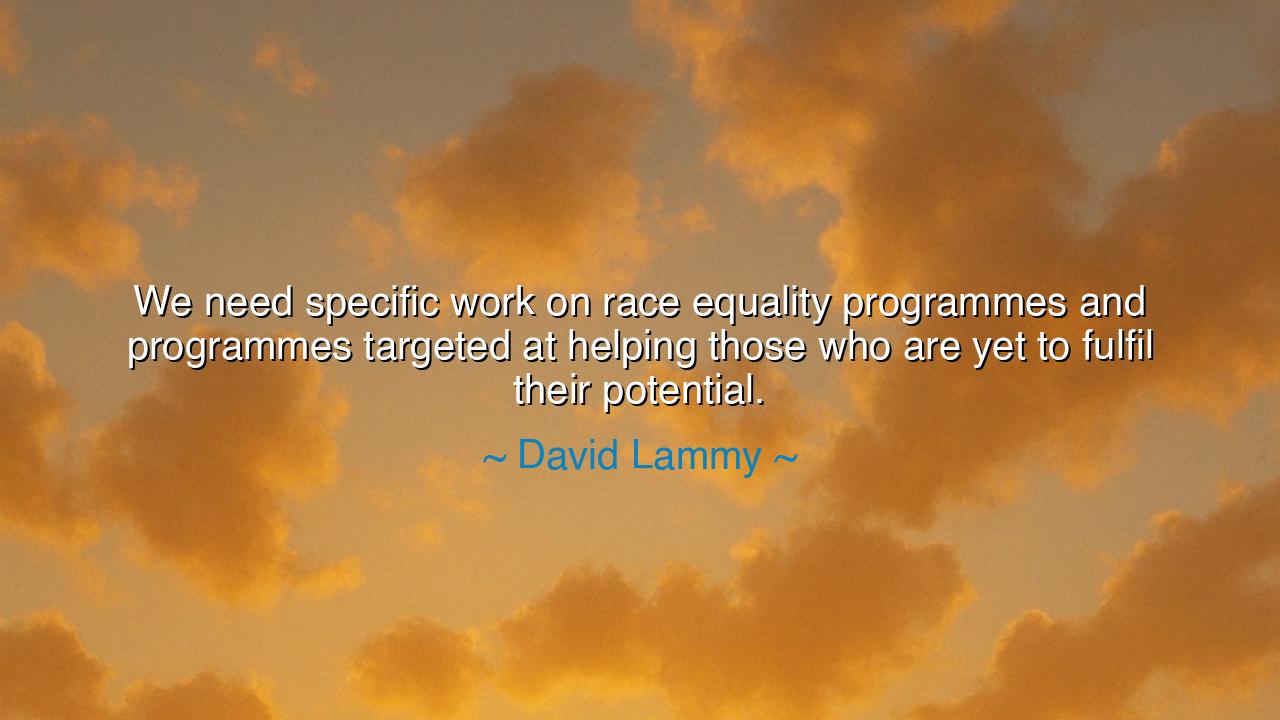
We need specific work on race equality programmes and programmes
We need specific work on race equality programmes and programmes targeted at helping those who are yet to fulfil their potential.






In the vast and unfolding journey of human civilization, the pursuit of equality has been a long and arduous path. It is a path marked by struggles, sacrifices, and the relentless effort to create a world where every individual has the opportunity to fulfill their potential. David Lammy, in his insightful words, speaks directly to the heart of this mission: “We need specific work on race equality programmes and programmes targeted at helping those who are yet to fulfil their potential.” These words stand as a call to action, a recognition that the work of equality is not just a lofty ideal but a concrete task that demands focused, intentional effort to ensure that all people, regardless of their race or background, can rise to their highest potential.
The ancients, too, understood that true equality was not merely about equal rights on paper, but about the active work required to level the playing field for all. In Ancient Greece, Pericles—a great Athenian statesman—sought to create a democracy that would give equal opportunity to all citizens, though, in practice, that equality was reserved for a limited group: free men. Yet even within these constraints, Pericles argued that every citizen should be allowed to fulfill their potential within the context of the state, whether in politics, arts, or warfare. His vision was one where the society would thrive when each person, no matter their social class, had the opportunity to contribute according to their abilities. But as David Lammy points out, the work of equality must be targeted and specific—just as Pericles’ vision was far from perfect, the pursuit of race equality today must focus on the most marginalized groups to truly achieve progress.
Consider the story of Spartacus, the gladiator who led a rebellion against the Roman Empire. Though Spartacus began his life as a slave, he rose to lead an army of slaves and oppressed people who were denied the basic freedoms and opportunities to reach their potential. His leadership became a symbol of the struggle for freedom and the fight for equality. However, despite his efforts and his vision, the rebellion was crushed, and those who followed him were left with little chance to live out their potential in a society that sought to suppress their growth. The story of Spartacus shows us that without targeted efforts to lift up those who are oppressed, the pursuit of equality will be hindered by the systems of power that seek to maintain their control over the potential of others.
David Lammy’s call for specific race equality programmes speaks to the need for action to correct the disparities that exist in our own time. Consider the Civil Rights Movement in the United States, led by figures like Martin Luther King Jr., who demanded not just the legal equality of African Americans, but real, substantive opportunities for them to rise above the limitations placed upon them by a system of segregation and racial injustice. Dr. King’s vision was not only about the abolition of laws that upheld racial discrimination but also about ensuring that African Americans had access to the tools, resources, and support they needed to achieve their full potential—to excel in education, employment, and every other field that would allow them to thrive. His work, like Lammy’s, acknowledged that equality is not simply a matter of laws being changed, but a deeper transformation in the systems that hinder the potential of entire communities.
The lesson embedded in Lammy’s statement is that the pursuit of equality is not a passive endeavor. It is a battle that requires focused, deliberate action to dismantle the barriers that prevent people from reaching their full potential. Race equality is not something that can be left to chance or mere rhetoric—it must be a targeted effort, with policies and programmes designed to address the specific needs of marginalized communities. As Plato once said, “Justice means minding your own business and not meddling with other men’s concerns.” But in the context of equality, this means that we must all mind the concerns of the oppressed—whether they are racial minorities, the economically disadvantaged, or any group that has been denied the opportunities that others have taken for granted.
David Lammy’s words remind us that while equality in its broadest sense is a noble goal, achieving it requires action—specifically targeted, thoughtful efforts to remove the structural barriers that continue to limit people’s potential. These programmes are not just about charity; they are about justice. They are not about giving people a handout but about lifting them up to a level playing field where their abilities can shine through, unimpeded by the social or systemic obstacles that hold them back.
So, in our own lives, let us commit ourselves to the work of equality—not just in our words, but in our actions. Let us support policies that target the inequalities that persist, ensuring that every individual has the resources and opportunities to rise to their highest potential. Let us be vigilant in the fight for justice, knowing that true equality is not simply the absence of discrimination, but the presence of opportunity, support, and access for all people, especially those who have been historically left behind. By doing so, we honor not just the ideals of equality, but the human dignity of every individual, ensuring that all have the chance to fulfill their potential and contribute to the common good.






AAdministratorAdministrator
Welcome, honored guests. Please leave a comment, we will respond soon